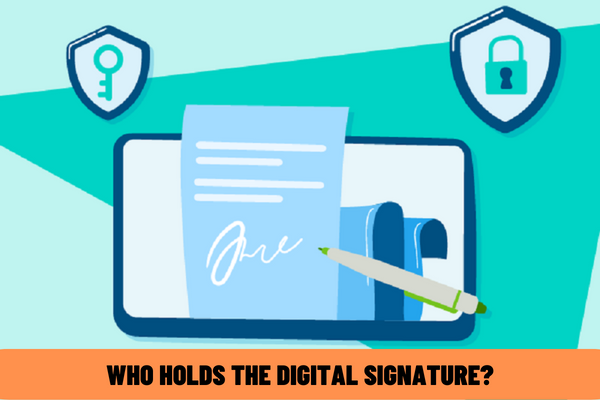According to the law of Vietnam, who holds the digital signature? What are the principles of using e-signatures?
What is a digital signature?
According to the guidance in Clause 6 Article 3 of Decree 130/2018/ND-CP of Vietnam on the digital signature:
“Article 3. Interpretation of terms
For the purposes of this Decree, these terms below shall be construed as follows:
…
6. "Digital signature" means a form of electronic signature created by the transformation of a data message using an asymmetric cryptography in which those who have initial data messages and the public key of the signer can be determined exactly:
a) The above transformation is created by the correct private key corresponding to public key in the same key pair;
b) The integrity of the content of data messages since the implementation of the mentioned above transformation.”

According to the law of Vietnam, who holds the digital signature? What are the principles of using e-signatures?
What are the principles of using electronic signatures?
Pursuant to Article 23 of the law on e-transactions 2005 of Vietnam on the principles of using e-signatures:
“Article 23. Principles of using e-signatures
1. Unless otherwise provided for by law, the parties to a transaction have rights to reach agreement:
a) To use or not to use e-signatures to sign data message in the transaction process;
b) To use or not to use the certified e-signature;
c) To select an e-signature certification service-providing organization in cases where there is an agreement on the use of the certified e-signature.
2. E-signatures of state agencies must certified by e-signature certification service providing organizations defined by competent state agencies.”
According to that, the use of digital signatures must ensure the above-mentioned principles.
What are the conditions to ensure security for digital signatures?
According to the guidance in Article 9 of Decree 130/2018/ND-CP of Vietnam on the conditions to ensure security for digital signatures:
“Article 9. Conditions to ensure security for digital signatures
The digital signatures are considered as secured electronic signatures if they meet the following conditions:
1. The digital signatures are created during the valid period of digital certificates and inspected by the public key recorded on such valid digital certificates.
2. The digital signatures are created by using the private key corresponding to public key recorded on digital certificates granted by one of the following authorities:
a) Root Certification Authority;
b) Specialized certification authorities of the Government;
c) Public certification authorities;
d) Specialized certification authorities of agencies and organizations issued with certificates of eligibility for special-use digital signature security as prescribed in Article 40 of this Decree.
3. Private Key is only under the control of the signer at the time of signing.”
Thus, a digital signature is considered secure when all the above conditions are satisfied.
Who holds the digital signature?
Pursuant to Article 25 of the law on e-transactions 2005 of Vietnam on the obligations of the signatory of an e-signature:
“Article 25. Obligations of the signatory of an e-signature
1. A signatory of an e-signature or his/her legal representative is the person who controls the electronic signing program and uses such equipment to certify his/her will regarding the signed data message.
2. A signatory of an e-signature shall have the following obligations:
a) To take measures to avoid unauthorized use of his/her e-signature-creating data;
b) To promptly use appropriate means to notify parties that accept the e-signature and the e-signature certification service-providing organization in case the e-signature is certified, when discovering that the e-signature may no longer be under his/her control;
c) To apply necessary measures to ensure the accuracy and integrity of information included in the e-certificate in case such certificate is used to certify the e-signature.
3. A signatory shall take responsibility before law for all consequences of his/her failure to comply with the provisions of Clause 2 of this Article.”
As for who holds the digital signature, the law currently has no specific regulations on this issue. According to the provisions of the obligations of signatory of an e-signature mentioned above, the holder of the electronic signature can be the person signing the electronic signature or the legal representative (representative under the authorization contract). However, the law currently does not have specific provisions on this content.
Thư Viện Pháp Luật
